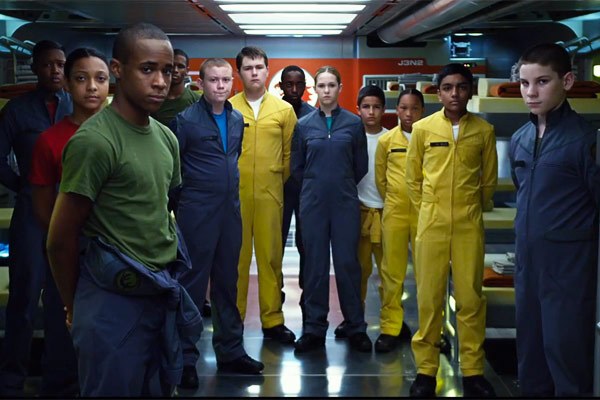
Originally posted November 2013 by Hank Brown.
Watching this film, I couldn’t help but draw comparisons to other specific sci-fi on the big screen: Not too long ago the Star Trek reboot showed us Kirk, Spock, McCoy and Uhura together at Star Fleet Academy. And some 15 years ago was the abysmal adaptation of Starship Troopers. I liked Star Trek, despite my annoyance at some aspects of it, but still, Ender’s Game is, so far, my favorite space cadets-playing-war-games movie.
As far as Heinlein goes, this film captured the spirit of his military science fiction better than the movie that bore the title of his trail-blazing book. I’ve never read Orson Scott Card, but am tempted to at least add his books to my bucket list, now.
Card used an interesting premise for this storyline: Future armed forces will train children for war, since youngsters adapt quicker to new/changing technology. Hence the hero is a child, with the responsibility of Earth’s very existence resting on his bony pre-adolescent shoulders.
Or is he a hero? It wouldn’t surprise me if the critics hate this movie because of what survives to the big screen from Card’s book: the suggestion that ruthlessness is required to win wars. That is watered-down considerably by writing the character as a “bleeding heart” type with an emotional maturity more on par with an aged monk…who just happens to be a savant with military tactics and strategy.
The acting is fair, on average–nothing spectacular. The boy playing Ender is called upon to be misty-eyed in too many close-ups to remember, and he delivers. And Harrison Ford hams it up (this is a consistent phenomenon in his recent roles, seems to me) as Ender’s stage mom commander. Other actors are believable enough. (In Ford’s defense, the role did strike me as written with a lack of dimension.)

What made the experience enjoyable for me was the character interaction written into the academy scenes. Group dynamics can be fascinating from an anthropological perspective (or depressing and infuriating from a participatory one). Reduce the group members in age to when the passion and motives of human beings are easily observed, and the intensity amplifies accordingly. For this reason I should have loved Lord of the Flies, but they lost me at “fade in.”
I can nit-pick pretty much any movie to death (even those I like), and have. This one is no exception. But I’ll just mention one thing that bothered me: the mixing of naval and land force ranks in one branch of service. Having sergeants, colonels and admirals all in the same branch is just…wrong.
But anyway, I found that the good outweighed the bad and Ender’s Game is worth a watch.
